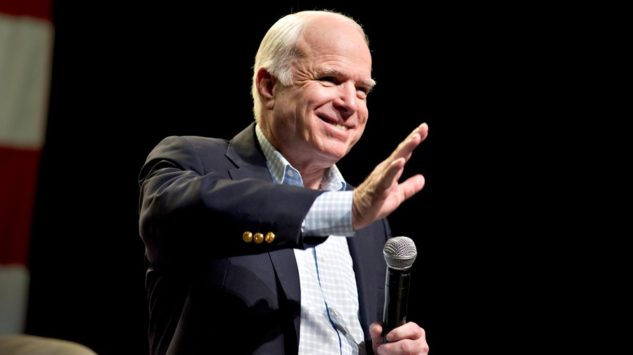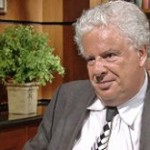Issue Briefs

John McCain and the Funeral of America’s Uni-power Moment
Martin Sieff
September 7, 2018
Who really mourned during the week of exceptional honors for Senator John McCain and what did they really mourn for? Who really grieved and why?
It did not appear to be the American public. At best they were casually respectful. The coverage of his funeral showed at least in Washington DC a respectful stream of thousands of mourners. But there was no outpouring of either numbers or grief.
That same week, the spectacular funeral of Aretha Franklin, the Queen of Soul in Detroit, with at least 130 pink Cadillacs accompanying her cortege, generated far deeper and more genuine human emotion.
A brave man
John McCain was an unquestionably brave man who endured years of torture; and his finest hour unquestionably was his passionate opposition to the widespread use of torture resorted to during President George W. Bush’s infamous Global War on terror (GWOT) in through the first decade of this century.
However, McCain was never president and was resoundingly rejected by the American people on the two occasions he ran in 2000 and 2008. Republican voters again rejected his impassioned efforts to block the rise of Donald Trump in 2016.
Keating Five Episode
In 1989, when McCain was exposed as one of the “Keating Five” senators who protected a massive savings and loan fraud and collapse, the Phoenix New Times newspaper in his home state of Arizona called him the worst senator (from any state) in US history.
https://www.phoenixnewtimes.com/news/mccain-the-most-reprehensible-of-the-keating-five-6431838
Not Churchill
The week of television coverage of McCain’s coffin revived a very different set of memories and associations for me. I remember as a young boy back in Ireland watching on a 14 or 15-inch black and white television screen the state funeral of Sir Winston Churchill in 1965.
The British people grieved then as seldom before and only once since for the funeral of Princess Diana in August 1997. At Churchill’s funeral, they were not just mourning the passing of a legendary hero who unlike McCain had been a genuine national leader with a vast record of success in wars, maintaining peace and implementing social reforms at home – all of which McCain palpably lacked.
When the high cranes of the Port of London were spontaneously lowered by their operators as Churchill’s funeral barge sailed up the Thames River, they were mourning not the passing just of a man, but an age: They were mourning the passing of Britain’s global greatness and the death of the British Empire.
McCain’s Funeral
That –the passing of an age– was the real significance of state grieving for John McCain. Without doubt there was a political subtext too. His death and funeral were eagerly adapted – with his own clear and enthusiastic consent before his passing – to further discredit embattled and beleaguered President Trump.
But there was a deeper tone clearly expressed. The self-appointed leaders and propagandists of the Establishment instinctively recognized that the death of McCain was symbolic of the passing of America’s Unipolar Moment, the Hyper-Power fantasy that Washington’s (self-imagined) Best and Brightest could impose their own precise models of freedom, free markets, democracy and globalism unilaterally on everyone everywhere – and that nothing could stop them, because they were righteous.
Misguided interventionism
McCain swallowed this dangerous nonsense about America’s right to impose democracy and free markets on anybody around the world to the day he died. He was oblivious to the unraveling of America’s power and potential. To the end, he held his strangely innocent faith that US global domination would last forever.
Churchill was both saner and more unfortunate. The global spanning empire to which he devoted his life vanished forever before his very eyes in the last two decades of his life.
Delusions of American omnipotence laid to rest
That is the real meaning of the week of mourning for John McCain. It was not just one viciously tempered and (according to some) personally unpleasant and abusive old man who was buried – all the shameless hagiography to the contrary. It was also a naïve certainty, and blasé innocence.
The United States certainly remains a global superpower. But it can no longer indulge in its post-Cold War fantasy of being free to do what it wants and impose what it wants on every other country in the world, regardless of circumstances.
America is not dead. Still the number one military and economic power. But the fantasy of America as an untrammeled Hyper-Power, bestriding a Unipolar Moment that would last for eternity, certainly is.
McCain and Krauthammer
Fittingly, less than two months before McCain’s passing, Charles Krauthammer, the revered wordsmith who, like McCain, never found a bombing campaign against innocent civilians he did not love and demand – also died. It was Krauthammer who had coined the term Unipolar Moment in the first place.
In fact, the unrelenting record of history reveals that unipolar moments are just that: they are “moments”. They never last for more than a generation, or a third of a lifetime, or so. The fantasy that one’s own country enjoys such limitless power, as the late wise George Kennan warned two decades ago, is to guarantee that national decline and worse will follow.
To adapt the words of Ireland’s greatest poet, W B Yeats:
“Hyper-Power America’s dead and gone. It’s with John McCain in the grave”
 |
Martin Sieff is a Global Policy Institute Fellow. He is author most recently of Gathering Storm: The Seventh Era of American History and the Coming Crises That Will Lead to It.
|
The views and opinions expressed in this issue brief are those of the author.